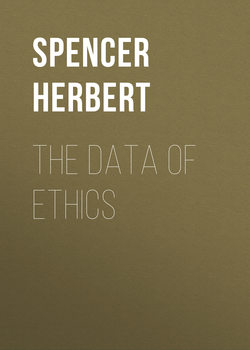The Data of Ethics

Реклама. ООО «ЛитРес», ИНН: 7719571260.
Оглавление
Spencer Herbert. The Data of Ethics
AUTHOR'S PREFACE
CHAPTER I. CONDUCT IN GENERAL
CHAPTER II. THE EVOLUTION OF CONDUCT
CHAPTER III. GOOD AND BAD CONDUCT
CHAPTER IV. WAYS OF JUDGING CONDUCT
CHAPTER V. THE PHYSICAL VIEW
CHAPTER VI. THE BIOLOGICAL VIEW
CHAPTER VII. THE PSYCHOLOGICAL VIEW
CHAPTER VIII. THE SOCIOLOGICAL VIEW
CHAPTER IX. CRITICISMS AND EXPLANATIONS
CHAPTER X. THE RELATIVITY OF PAINS AND PLEASURES
CHAPTER XI. EGOISM VERSUS ALTRUISM
CHAPTER XII. ALTRUISM VERSUS EGOISM
CHAPTER XIII. TRIAL AND COMPROMISE
CHAPTER XIV. CONCILIATION
CHAPTER XV. ABSOLUTE AND RELATIVE ETHICS
CHAPTER XVI. THE SCOPE OF ETHICS
Отрывок из книги
§ 1. The doctrine that correlatives imply one another – that a father cannot be thought of without thinking of a child, and that there can be no consciousness of superior without a consciousness of inferior – has for one of its common examples the necessary connection between the conceptions of whole and part. Beyond the primary truth that no idea of a whole can be framed without a nascent idea of parts constituting it, and that no idea of a part can be framed without a nascent idea of some whole to which it belongs, there is the secondary truth that there can be no correct idea of a part without a correct idea of the correlative whole. There are several ways in which inadequate knowledge of the one involves inadequate knowledge of the other.
If the part is conceived without any reference to the whole, it becomes itself a whole – an independent entity; and its relations to existence in general are misapprehended. Further, the size of the part as compared with the size of the whole must be misapprehended unless the whole is not only recognized as including it, but is figured in its total extent. And again, the position which the part occupies in relation to other parts, cannot be rightly conceived unless there is some conception of the whole in its distribution as well as in its amount.
.....
We allege imperfection of any inanimate thing, as a tool, if it lacks some part needful for effectual action, or if some part is so shaped as not to fulfill its purpose in the best manner. Perfection is alleged of a watch if it keeps exact time, however plain its case; and imperfection is alleged of it because of inaccurate time-keeping, however beautifully it is ornamented. Though we call things imperfect if we detect in them any injuries or flaws, even when these do not detract from efficiency; yet we do this because they imply that inferior workmanship, or that wear and tear, with which inefficiency is commonly joined in experience: absence of minor imperfections being habitually associated with absence of major imperfections.
As applied to living things, the word perfection has the same meaning. The idea of perfect shape in a race-horse is derived by generalization from those observed traits of race-horses which have usually gone along with attainment of the highest speed; and the idea of perfect constitution in a race-horse similarly refers to the endurance which enables him to continue that speed for the longest time. With men, physically considered, it is the same: we are able to furnish no other test of perfection than that of complete power in all the organs to fulfill their respective functions. That our conception of perfect balance among the internal parts, and of perfect proportion among the external parts, originates thus, is made clear by observing that imperfection of any viscus, as lungs, heart, or liver, is ascribed for no other reason than inability to meet in full the demands which the activities of the organism make on it; and on observing that the conception of insufficient size, or of too great size, in a limb, is derived from accumulated experiences respecting that ratio among the limbs which furthers in the highest degree the performance of all needful actions.
.....